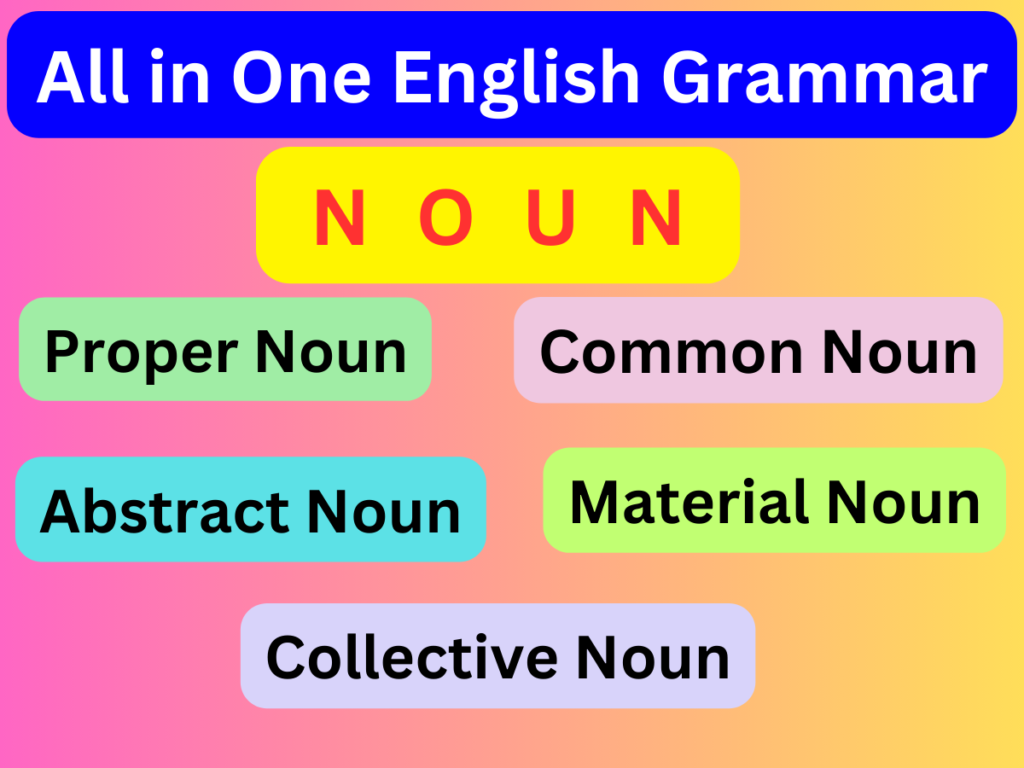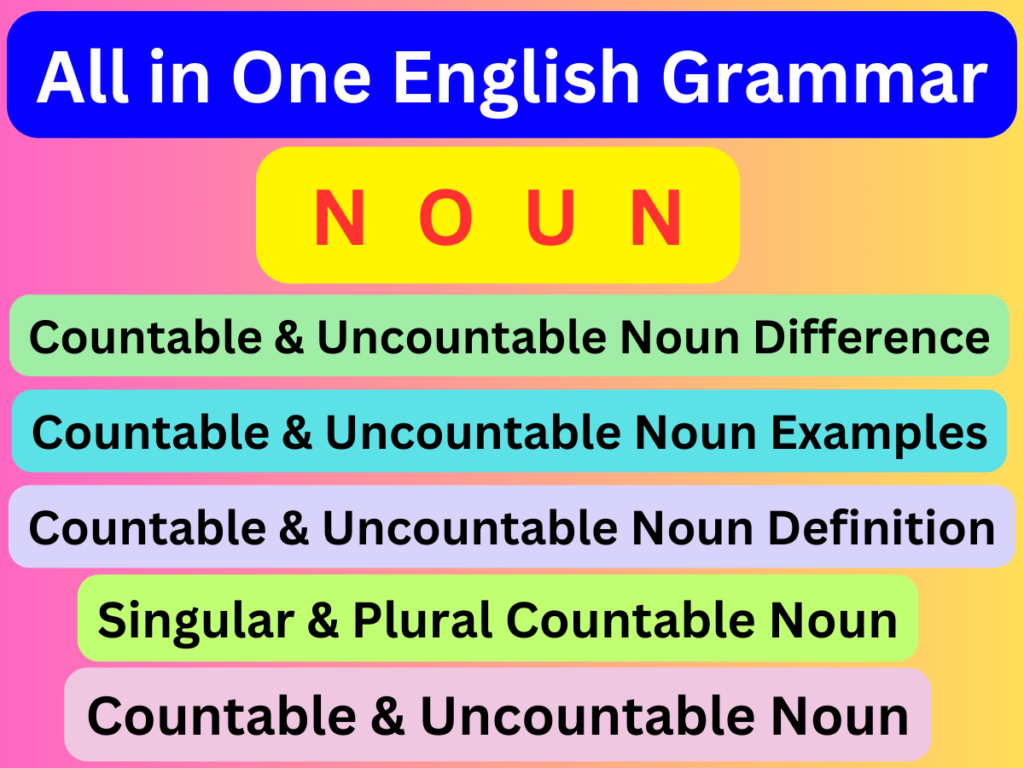Types of Pronoun with Examples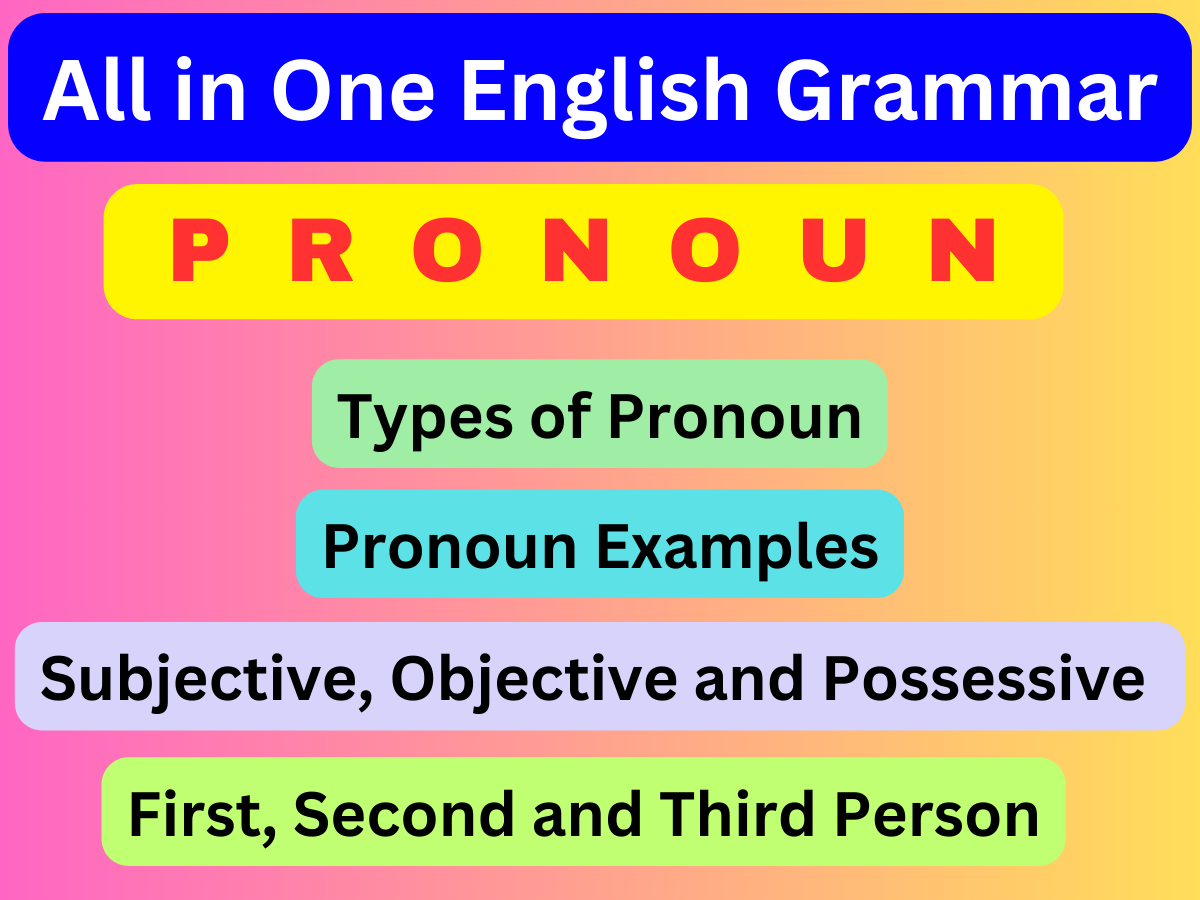
Types of Pronoun with Examples
DEFINITION OF PRONOUN
Pronoun is a word that takes the place of a noun. Pronoun is a word that substitute for a noun.
Pronoun in Hindi
सर्वनाम (Pronoun) एक ऐसा शब्द है जो संज्ञा (Noun) का स्थान ले सकता है| सर्वनाम संज्ञा का विलाप होता है
EXAMPLES OF PRONOUN
Ajay (Noun) is a student of my class.
He (Pronoun) is a student of my class.
Suman (Noun) is a good girl.
She (Pronoun) is a good girl.
TYPES OF PRONOUN
Personal Pronoun
Subjective Pronoun
Objective Pronoun
Possessive Pronoun
Reflexive Pronoun
Emphatic Pronoun
Demonstrative Pronoun
Indefinite Pronoun
Distributive Pronoun
Reciprocal Pronoun
Relative Pronoun
Interrogative Pronoun
PERSONAL PRONOUN
Pronoun which is used in a sentence to for subject, object or authority of other object.
जिस Pronoun का उपयोग वाक्य में कर्ता, कर्म या दूसरी वस्तुओं पर अधिकार बताने के लिए किया जाता है
Personal Pronoun Can be classified into 3 groups
Personal Pronoun को 3 समूहों में बांटा जा सकता है
1. First Person
2. Second Person
3. Third Person
Ex – I, We, You, He, She, It, They
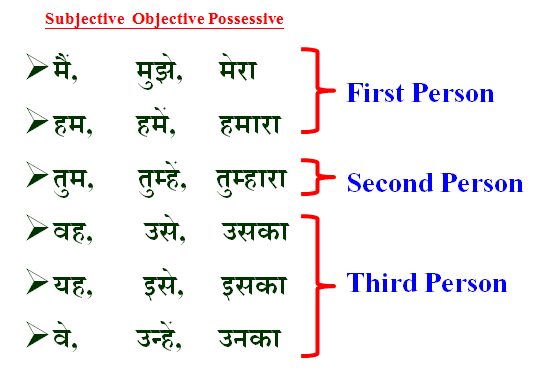
First Person
The Pronoun refers to self like I and we. Where we talk about myself.
जब स्वयं के बारे में बात होती है
I, We
First Person Examples
I go to school. (मैं विद्यालय जाता हूँ)
I won’t be in class tomorrow. (मैं कल कक्षा में नहीं आउंगा)
I am a student. (मैं एक विद्यार्थी हूँ )
We go to school.
We will come to school tomorrow.
We are students.
Second Person
The Pronoun refers to the person being talked to.
उस Person को बताता है जिससे बात की जा रही है
You
Second Person Examples
You go to school. (तुम विद्यालय जाते हो )
You will come to class tomorrow. (तुम कल कक्षा में आओगे)
You are a student. (तुम एक विद्यार्थी हो )
You are studying. (तुम पढ़ रहे हो)
You are my student. (तुम मेरे विद्यार्थी हो)
Third Person
The Pronoun you are talking about.
जिस Pronoun के बारे में बात की जा रही हो
He, She, It, They
Third Person Examples
He goes to school. (वह विद्यालय जाता है)
She goes to school. (वह विद्यालय जाती है)
They go to school. (वे विद्यालय जाते हैं)
It is a book. (यह एक पुस्तक है)
Subjective Pronoun
Objective Pronoun
Possessive Pronoun
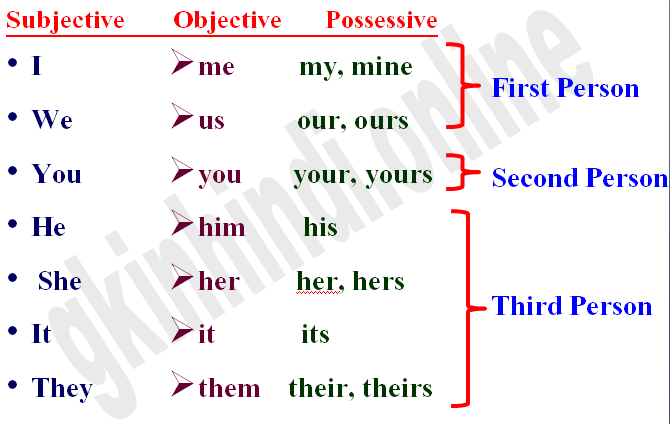
Subjective Pronoun
When the Personal Pronoun is used as a subject.
जब Personal Pronoun का उपयोग वाक्य में कर्ता के रूप में होता है
Ex – I, We, You, He, She, It, They
Examples of Subjective Pronoun
He is a doctor. (वह चिकित्सक है)
She is an Engineer. (वह इंजीनीयर है)
I am a teacher. या I’m a teacher (मैं शिक्षक हूँ)
You are scientist. (तुम वैज्ञानिक हो)
They are employees. (वे लोग कर्मचारी हैं)
We are students. (हम विद्यार्थी हैं)
Objective Pronoun
When the Personal Pronoun is used as a object.
जब Personal Pronoun का उपयोग वाक्य में कर्म के रूप में होता है
Him, Her, Me, You, Them, Us, It
Examples of objective Pronoun
You told me. (तुमने मुझे कहा था)
Play with us. (हमारे साथ खेलो)
I said to him/her. (मैंने उसे कहा)
I did not invite him to my birthday party. (मैंने उन्हें अपने जन्मदिवस के समारोह में नहीं बुलाया)
I told them. (मैंने उन्हें कहा था)
Possessive Pronoun
The pronoun which shows the possession or ownership is called possessive pronoun. ( To Assert one’s own or other’s rights)
इस Pronoun में स्वयं के भाव या अधिकार का बोध होता है (अपना या दूसरों का अधिकार बताने के लिए)
my (mine), our (ours), your(yours), their(theirs), his, her(hers), its
Examples of Possessive Pronoun
He is my friend. (वह मेरा दोस्त है)
This is my book. (यह मेरी किताब है)
This book is mine. (यह किताब मेरी है)
This is our school. (यह हमारा विद्यालय है)
This school is ours. (यह विद्यालय हमारा है)
This is your house. (यह तुम्हारा घर है)
This house is yours. (यह घर तुम्हारा है)
This is his book. (यह उसकी किताब है)
This book is his. (यह किताब उसकी है)
This is her book. (यह उसकी किताब है)
This book is hers. (यह किताब उसकी है)
This is their bag. (याह उनका बैग है)
The bag is theirs. (बैग उनका है)
EMPHATIC PRONOUN
When Pronoun is used to emphasize a Noun or Pronoun in a sentence.
जब Pronoun का उपयोग वाक्य में Noun या Pronoun पर जोर देने के लिए होता है
Myself, him self, herself, themselves, itself, yourself, ourselves.
Emphatic Pronoun Example
I heard the truth myself. (मैंने स्वयं सच सुना)
I myself heard the truth. (Intensive)
Nothing is impossible for the man who have to do it himself. (उस आदमी के लिए कुछ भी असंभव नहीं है जिसे स्वयं करना है)
She will do it herself. (वह स्वयं कर लेगी)
The boys cooked food themselves. (लड़कों ने स्वयं खाना बनाया)
The dog open the door itself. (कुत्ते ने स्वयं दरवाजा खोला)
Do your work by yourself. (अपना कार्य स्वयं करो)
We cleaned the school ourselves. (हमने स्वयं विद्यालय साफ़ किया)
REFLEXIVE PRONOUN
When the work done by subject has effect on subject.
जब Subject के द्वारा किये गए कार्य का प्रभाव Subject पर ही होता है
Myself, him self, herself, themselves, itself, yourself, ourselves
Relative Pronoun Examples
Ajay hurt himself. (अजय ने स्वयं को चोट पहुंचाई)
Ajay hurt himself while playing cricket.
He/She hurt himself while playing cricket.
I got success myself. (मैने सफलता स्वयं ही प्राप्त की)
DEMONSTRATIVE PRONOUN
The Pronoun that is used to indicate object.
वह Pronoun जो Object को संकेत करने के लिए उपयोग किया जाता है
This, That, These, Those.
Demonstrative Pronoun Examples
This is a pen. (यह एक कलम है)
That is a pen. (वह एक कलम है)
These are pens. (ये कलम हैं)
Those are pens. (वे कलम हैं)
Indefinite Pronoun
The Pronoun that does not make sense of a certain person or thing.
वह Pronoun जिससे किसी निश्चित व्यक्ति या वस्तु का बोध नहीं होता है
All, Many, Some, No, Every.
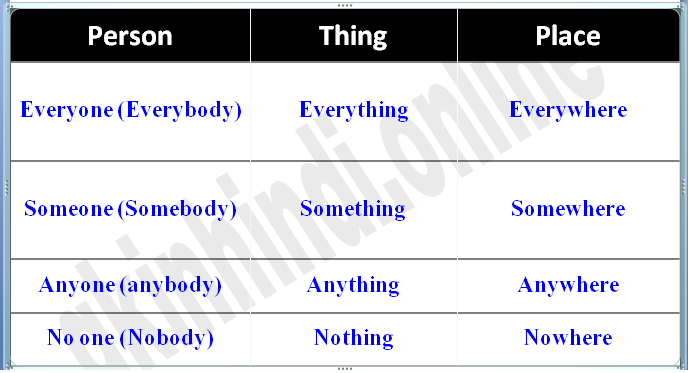
Indefinite Pronoun Examples
Some are good. (कुछ अच्छे हैं)
All is good. (सब अच्छा है)
Someone is there. (वहां कोई है)
Somebody is there. (वहां कोई है)
Something is there (वहां कुछ है)
Something is running in your mind. (आपके/तुम्हारे दिमाग में कुछ तो चल रहा है)
You have something in your hand. (तुम्हारे हाथ में कुछ है)
Nothing is impossible. (कुछ भी असंभव नहीं है)
Nobody can defeat him. (उसे कोई नहीं हरा सकता)
Everyone can do anything. (हर कोई कुछ भी कर सकता है)
Anyone can do anything. (कोई भी कुछ भी कर सकता है)
Anyone can succeed. (कोई भी सफल हो सकता है)
Everyone is sleeping in hall. (सब लोग Hall में सो रहे हैं)
Someone is sleeping in hall. (कोई Hall में सो रहा हैं)
No one is sleeping in hall. (कोई भी Hall में नहीं सो रहा है)
You gave everything to him. (तुमने उसे सबकुछ दे दिया)
He saw something in room. (उसने कमरे में कुछ देखा)
There is nothing in room. ( कमरे में कुछ भी नहीं था)
I looked everywhere for my pen. (मैंने अपनी कलम के लिए हर जगह देखा)
Looking somewhere. (कहे देख रहे हैं)
They can choose anything.
You can go anywhere in holiday.
You gave anything to him. (तुमने उसे कुछ भी दिया)
Your fear would follow you anywhere. (तुम्हारा डर कहीं भी तुम्हारा पीछा करता)
DISTRIBUTIVE PRONOUN
When Pronoun is used to make sense of any one or even one of two or more persons or object. (Pronoun by which person or objects can be divided or separated)
जब Pronoun का उपयोग दो या दो से अधिक व्यक्तियों या वस्तुओं में से किसी एक या एक का भी नहीं का बोध कराने के लिए किया जाता है (ऐसे Pronoun जिससे व्यक्ति या वस्तुओं को बांटा या अलग बताया जा सकता है)
Each, Either, Neither
Distributive Pronoun Examples
Each of us wrote. (हममे से हर एक ने लिख लिया)
Each one of you can do this work. (तुम में से हर कोई यह कार्य कर सकता है)
Read either of you. (तुममे से कोई एक पढ़ो)
Either of these has that information. (इनमें से किसी के पास वह जानकारी है)
You can sit either side of window. (आप खिड़की के दोनों ओर बैठ सकते हैं)
Neither of the newspaper is in english. (कोई अखबार english में नहीं है)
Neither of the human can do it. (कोई इंसान ऐसा नहीं कर सकता)
RECIPROCAL PRONOUN
Pronoun that describes the interrelationship between two or more person or objects.
वह Pronoun जो दो या दो से अधिक व्यक्ति या वस्तुओं के बीच परस्पर सम्बन्ध को बताता है
Each other, One another
Reciprocal Pronoun Examples
Ajay and Vijay playing with each other. (अजय तथा विजय एक दूसरे के साथ खेल रहे हैं)
We gave gifts each other. (हमनें एक दूसरे को उपहार दिए)
They can’t see each other. (वह एक दूसरे को नहीं देख सकते)
The ten men were all accusing one another. (वह दस व्यक्ति एक दूसरे पर आरोप लगा रहे थे)
Reena and sunita hate each other.
Both teams played hard against each other.
Why don’t you believe each other?
Ajay, Vijay, sumit and sagar are beating one another. (अजय, विजय, सुमित तथा सागर एक दूसरे को पीट रहे हैं)
The boys were fighting one another. (लडके आपस में लड़ रहे थे)
RELATIVE PRONOUN
Pronoun that connect the sentence with the second sentence or refers to the preceding noun.
वह Pronoun जो वाक्य को दूसरे वाक्य से जोड़ता है या पहले आये हुए Noun से संबंध बताता है
Who, Whom, Whose, Which, What, That
Who – Refers to a person (As verb’s subject)
Whom – Refers to a person (As verb’s object)
Which – Refers to an animal or thing
What – Refers to a non living thing
That – Refers to a person, animal or thing
Relative Pronoun Examples
The boy is eating. The boy is my friend.
The boy who is eating is my friend.
The man is standing there. The man is my friend.
The man is standing there that is my friend.
This is the book that was given to me.
The boy who come to the door left parcel for you.
(वह लड़का जो दरवाजे पर आया था तुम्हारे लिए पार्सल छोड़ गया)
I am not sure whom this book belongs to.
(मुझे यकीन नहीं है की यह पुस्तक किसकी है)
Alu Paratha, which I eat at least twice a week, is one of my favorite meal.
(आलू पराठा, जिसे मैं सप्ताह में कम से कम दो बार खाता है, मेरा पसंदीदा भोजन है)
This is what we where talking about.
(यह वही है जिसके बारे में बात कर रहे थे)
INTERROGATIVE PRONOUN
Pronoun that is used to ask a question.
वह Pronoun जिसका उपयोग प्रश्न पूछने के लिए किया जाता है
Who, Whom, Whose, Which, What
Interrogative Pronoun Examples
Who are you? (तुम कौन हो?)
What is your name? (तुम्हारा नाम क्या है?)
Who is your brother? (तुम्हारा भाई कौन है?)
Which is your pen? (कौन सी कलम तुम्हारी है?)
Which is your phone? (कौन सा Phone तुम्हारा है?)
Whom shall we ask? (हम किससे पूछेंगे?)
Whose is this? (यह किसका है?)
“यहाँ Pronoun और उसके प्रकारों को समझाने के लिए सरल शब्दों का प्रयोग करने का प्रयास किया गया हैं और प्राप्त जानकारी के अनुसार Pronoun तथा Types of Pronoun को समझाया गया है यदि जानकारी अच्छी तथा उपयोगी हो तो इसे अन्य विद्यार्थियों को Share कर सकते हैं जिससे उन्हें भी इसका लाभ प्राप्त हो“
Important Question Answer
Click Here for Important Question-Answer – Computer
Click Here for Important Question-Answer – Indian Geography
Click Here for Important Question-Answer – World Geography
Click Here for Important Question-Answer – Indian History
Click Here for Important Question-Answer – Economy
Click Here To Go To Home Page and Get More Knowledge
Click Here To Join and Follow Whats App Channel for More Updates

